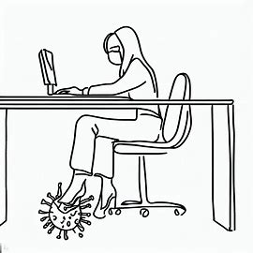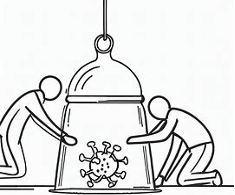COVID just won’t leave us alone! In New York City, average levels of the virus have been increasing in wastewater throughout the summer of 2023. Nationally, hospitalizations and deaths from COVID showed sharp increases in September, especially among people over 70 or under 5 years of age, and are expected to continue to rise into the winter. 
Because all levels of government have declared the health emergency over, CUNY has ceased taking protective action – no testing, no notification procedures, no contact tracing, no vaccine mandate, very few free masks. It is even uncertain whether enhanced ventilation is still in operation.
Fortunately, most healthy adults and older children have some immunity and are less likely to suffer severe disease than during the first year of the pandemic, though they can still spread the virus to vulnerable people. But even mild infection with SARS-CoV-2 can have consequences, including long-term impact on multiple organ systems.
Under the circumstances, how can we protect ourselves and others? The good news is that most precautions against COVID also protect people from other airborne infectious diseases, including flu and RSV. And handwashing protects against a host of other infectious diseases.
Protect Yourself
Insist on clean air! If you’re uncertain about the ventilation in your workspace, contact the Ventilation Squad of the PSC Environmental Health & Safety “Watchdogs” Committee: [email protected]. If your college provided a HEPA room air filtration unit, keep running it at the highest possible setting! If you HAD room air filtration that has been removed or is inoperable, contact the Watchdogs immediately!
Get the new booster targeted to Omicron variants. Most health insurance, including Medicare, covers it.
Wear disposable respirators when in crowded settings, including airplanes and subways. Respirators protect you and others. The best protection is provided by the NIOSH-certified N95, but the KF94 and KN95 are also protective. This video explains why masking matters!
If possible, continue to arrange work spaces and work schedules to maximize physical spacing.
If you are teaching, ask students to stay home if they’re sick and to isolate themselves for at least 5 days if they test positive for COVID. Include a notice about this in your syllabus. Be sure to excuse the absence and thank students for being considerate of others.
Some people who contract COVID develop long-term health complications (long COVID). If you believe you were infected at work, you may be eligible for Workers’ Compensation. Learn more here.
Protect Others
Cover your cough or sneeze by using a tissue. If that’s not possible, cough or sneeze into your elbow as recommended here. 
Test yourself for COVID if you have cold or flu-like symptoms. Order four free tests from covidtests.gov. Don’t throw away old unused test kits; the expiration dates for most have been extended (check covidtests.gov for the new expiration dates).
If you test positive for COVID:
- Don’t expose others. People without symptoms shed virus and can be contagious.
- Notify people with whom you’ve been in contact.
- Stay home. Follow CDC guidance. Isolate for at least 5 days; wear a mask around others.
- If you’re well enough to work and don’t want to deplete your sick bank, arrange with your supervisor to work or teach remotely while isolating.
Adjunct faculty, non-teaching adjuncts, and adjunct CLTs have the right to paid sick leave equal to 1/15th of their teaching time or clock time. Sick leave for those on 3-year contracts rolls over.
CUNY’s current policy allows for paid sick leave for employees who are “subject to a mandatory or precautionary order of quarantine or isolation due to COVID-19”. See your doctor to get this order if you test positive for COVID. However, this policy implies that it is acceptable to return to work if your symptoms are mild. This will put others at risk, as people with mild symptoms can still be contagious. If you have any symptoms, stay home or request remote work.
What PSC Chapters Can Do
Advocate (including at Labor-Management meetings) for people to be excused if they are sick and for flexibility in remote work:
- Faculty – change teaching modality temporarily with mild cases not requiring sick leave
- Staff – work remotely while isolating, in accordance with CDC recommendations
Ask college management the following:
- What is the protocol for employees/students to report a positive COVID test?
- Are you encouraging faculty and staff to follow CDC recommendations on isolation?
- Are you supplying masks?
- How are you continuing to maintain safe ventilation?
- Where portable air filtration/purification devices were provided, are they still available?
- What should a member do if they have concerns about ventilation in their area?
Visit the Watchdogs’ website at https://psc-cuny.org/about-us/environmental-health-and-safety/
Published: November 9, 2023

